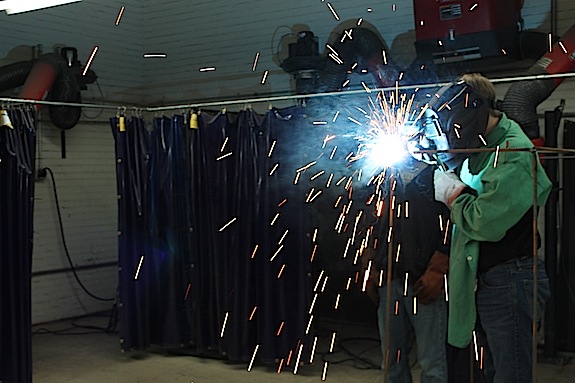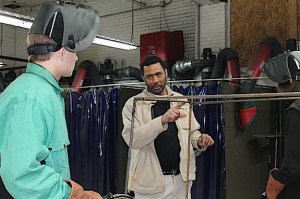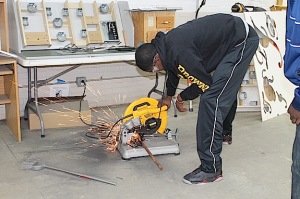Still in its infancy, DHS Precision Machining program already making enormous impact

Charles Jones Jr. doesn’t see what others do when they gaze on the rows of precision machine tools installed at the new Shelton State Community College campus, the former New Era building.
Jones sees what can be – a self-contained Career Tech center that will house a full Industrial Maintenance course of study for Demopolis High School students. That course will include welding, electronics or programmable logic control (PLC), hydraulics and pneumatics.
“We’re close,” said Jones. “We have a couple of grants in the works right now for electrical training and PLC training.”
In his section of the building he offers precision machining and introductory courses to milling and lathe.
When students complete his courses, they will have earned articulated credit to Shelton State or any other higher level school that will equal the first course of study at that school, Jones said.
In a separate room he also teaches two classes in welding on equipment that the University of West Alabama uses for adult education classes at night.

“We have one facet if we can keep the resources,” he continued. “We feel if we add pneumatics, hydraulics and get that PLC going, we will have a full-blown industrial maintenance program like no other in the state.”
Only nine machinist programs are located in Alabama high schools now, he said. “All my counterparts that I show my shop to, their jaws just drop because that’s unheard of for a high school program to have as many machines as we do.”
With the donated and grant-purchased equipment, students won’t have to wait their turn to use the resources. Jones recently was awarded a grant that includes $32,500 to hook up the all the machines.
Another recent grant helped purchase two welding simulating machines, which were bought at a discount of $39,000 each.
Students can simulate the weld and go through everything a welder does without using the resources, he explained. There are no burn rods, there is no live fire.
“You can ask a kid something about welding and he knows nothing. You can ask him what’s the latest ‘Call to Duty’ game and he knows everything about it,” joked Jones. “This is nothing but a big video game, but I can tie this big video game into you making money.”
Because the simulator is safe, Jones can interest students at Demopolis Middle School in welding without any safety problems. DMS Principal Blaine Hathcock and Jones have worked out a plan to introduce welding to boys and girls at the school.

He believes girls make better welders that men. Jones has a girl in one of his classes that he calls a natural welder.
At this time only juniors and seniors are enrolled in his courses. To add any more would require hiring another instructor.
He sees no slowdown in the need for such skilled labor. “We were so fast building America, now we have to drop back and rebuild,” he explained
There is a shortage of welders. Already Jones has had recruiters trying to lure his students into their programs. Welders are in high demand and make very lucrative salaries, even in an entry level position. “It’s unreal what this profession is doing right now.”
Students who complete his courses are eligible to apply for certifications which help when they apply for jobs. The can earn an OSHA 10 card, the Ready-to-Work certificate through the State of Alabama, and certifications from the National Center for Construction Education and Research (NCCER) and the National Institute of Metalworking Skills (NIMS) in benchwork and layout.
Jones works with the Academy of Insurance and Finance career tech program as well. The students in the academy are taken through the pitfalls of faulty electricity and plumbing, which enhances their coursework.
In addition, his own students are taught electrical and plumbing basics as a side course.
“We’re trying to work together in Career Tech,” he said.
This story is part of a series highlighting the career tech programs at Demopolis High School. The series will appear on Sundays throughout February in honor of Career Tech Month.
